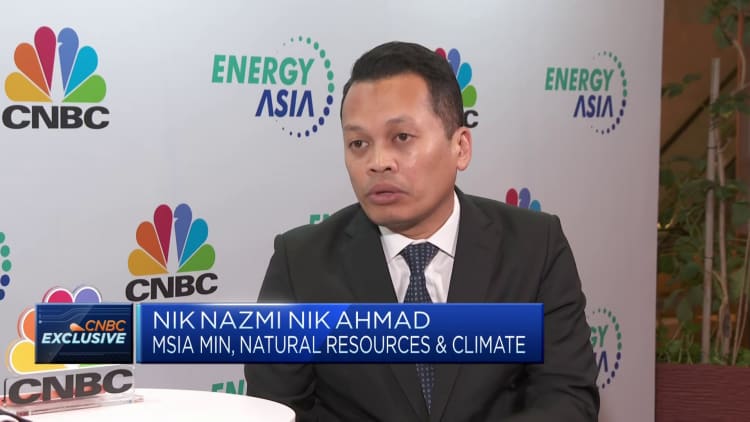Fotograzia | Moment | Getty Images
BOSTON — As worried about climate change as workers might be, it can be tricky if not impossible to invest with the environment in mind in your workplace retirement plan.
Less than 5% of 401(k) plans offer funds dedicated to environmental, social and governance, or ESG, issues, according to the Plan Sponsor Council of America’s latest member survey.
“There has been significant growth in the availability of ESG funds over the past five years, but including them in 401(k) plans has been slower,” said Georges Dyer, co-founder and executive director of the Crane Institute of Sustainability. CNBC interviewed him after he spoke on a panel at the GreenFin conference this week in Boston.
More from Personal Finance:
Retirees’ biggest fear is outliving their assets, research finds
Social Security may be key issue for GOP presidential rivals
This tool lets you play at fixing Social Security woes
As a result, the money Americans have in their 401(k) plans are likely enabling fossil fuel extraction and deforestation, experts say. Both are issues that climate scientists blame for the warming planet.
“In terms of accelerating climate change, a key impact of continuing to invest in high-carbon industries [or] greenhouse gas emissions is signaling to markets and governments that it’s okay to continue with business-as-usual,” said Andrew Behar, chief executive officer of As You Sow, a nonprofit promoting corporate environmental and social responsibility.
Companies slow to offer ESG options in 401(k)s
Worried about confusing employees, 401(k) plan sponsors are often wary of adding more fund options to their line-up, Dyer said.
“If they have gone through a process of selecting funds they are confident in including, they can be hesitant to trade those out for new funds,” he said.
Increasingly, employees are automatically enrolled in their 401(k) plan without weighing in on their investments. Often, their money is put in so-called target-date funds, which have become more popular for the fact that they automatically adjust the mix of investments over time to reduce risk as the worker approaches retirement.
More than 45% of fund options offered in retirement plans are target-date funds, according to research by the CFA Institute.
Yet this ease may be making it harder for the planet: the CFA found that target-date funds have a 16% higher weighted carbon intensity compared to all the retirement plans it sampled.

Meanwhile, some employers may be worried that their workers won’t get high enough profits from ESG funds, Dyer said.
“Despite a large body of evidence that shows ESG funds tend to perform as well or better than non-ESG funds, a persistent misperception remains that they don’t,” Dyer said. (Indeed, an analysis by Morgan Stanley in 2019 found that there was no significant difference in total returns between ESG-focused funds and traditional mutual funds.)
Political fights have also hindered adoption
ESG funds have also not been spared from the political fight over climate change. That’s another factor slowing their adoption on 401(k) menus, experts say.
A Trump administration-era rule discouraged retirement plan sponsors from offering ESG funds, experts say. Under President Joe Biden, the Department of Labor has since changed that policy. Biden also used his first presidential veto to save the rule on investment choices related to ESG.
“The DOL rule is very clear that ESG factors may be material to investment performance, and therefore may be considered in the investment process,” Dyer said.
Although that rule remains in effect, it is currently being challenged in federal court in Texas, said Bradford Campbell, a former DOL official who also spoke at GreenFin. House Republicans also recently introduced legislation that could limit the use of EGS funds, or what they call “woke” investing.
“Interest in ESG-related investments is growing,” Campbell said. “But uncertainty about the future of the regulation due to the pending litigation and the possibility of policy changes [in] the next presidential election are certainly affecting the pace at which plans adopt such investments.”
How to examine your ESG 401(k) options
If you’re in the small pool of employees who do have access to an ESG fund in your retirement plan, your research may end there.
“Unfortunately, most often we see that if a 401(k) offers sustainable investments, it offers just one,” Behar said.
If you do find multiple ESG options on your menu, you can use look up which funds are climate-safe and also offer competitive returns, Behar said. Tools to do so include As You Sow’s Fossil Free Funds and MSCI’s ESG database.
For most other workers who aren’t able to divest from firms potentially worsening climate change, Behar recommends speaking to management at your company and requesting that sustainable funds be made available.
“It’s possible that a simple ask can start the process,” he said.
Employers have a fiduciary duty to administer retirement plans in the best interest of plan participants.
Andrew Behar
chief executive of As You Sow
If doing so doesn’t lead anywhere, employees may consider organizing with their colleagues, Behar said: “It’s easier to ignore a single voice than a chorus.”
His website includes an action toolkit to help employees make the case for a sustainable investment option in their retirement plan.
“Employers have a fiduciary duty to administer retirement plans in the best interest of plan participants,” Behar said. “If they’re are not assessing climate risks as part of that process, they may be failing.”
 EU News Digest Latest News & Updates
EU News Digest Latest News & Updates



